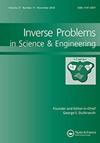Simultaneous reconstruction of optical absorption property and speed of sound in intravascular photoacoustic tomography
IF 1.1
4区 工程技术
Q3 ENGINEERING, MULTIDISCIPLINARY
引用次数: 1
Abstract
Intravascular photoacoustic tomography (IVPAT) is a newly developed imaging modality for the diagnosis and intervention of coronary artery diseases. It is an ill-posed nonlinear least squares (NLS) problem to recover the absorbed optical energy density (AOED) and optical absorption coefficient (OAC) distribution in the vascular cross sections from pressure photoacoustically generated by tissues with variable speed of sound (SoS). The prior knowledge of the SoS is usually unavailable before IVPAT scanning. The ideal assumption of a constant SoS leads to degraded image quality. This paper focuses on improvement of image quality for IVPAT in tissues with variable SoS by simultaneously recovering the SoS, AOED and OAC from the measured time-dependent pressure series. The joint recovery is implemented by alternately minimizing the errors between the measured and theoretical pressure by forward simulation. The demonstration results indicate that the normalized mean square absolute distance (NMSAD) of the reconstructions produced by this method is decreased by about 15% in comparison to that of the reconstructions with a fixed SoS. Comparison results show that this method outperforms the delay compensation method in recovering the AOED and the two-step algorithm in estimating the OAC by about 20% and 25% in NMSAD respectively.血管内光声断层成像中光吸收特性和声速的同时重建
血管内光声断层扫描(IVPAT)是一种新开发的用于诊断和干预冠状动脉疾病的成像模式。从可变声速组织(SoS)产生的压力光声中恢复血管截面中的吸收光能密度(AOED)和光吸收系数(OAC)分布是一个不适定非线性最小二乘(NLS)问题。在IVPAT扫描之前,SoS的先验知识通常不可用。恒定SoS的理想假设会导致图像质量下降。本文的重点是通过从测量的时间相关压力序列中同时恢复SoS、AOED和OAC,提高具有可变SoS的组织中IVPAT的图像质量。联合回收是通过正演模拟交替最小化测量压力和理论压力之间的误差来实现的。演示结果表明,与具有固定SoS的重建相比,该方法产生的重建的归一化均方绝对距离(NMSAD)减少了约15%。比较结果表明,在NMSAD中,该方法在恢复AOED方面优于延迟补偿方法,在估计OAC方面优于两步算法,分别提高了约20%和25%。
本文章由计算机程序翻译,如有差异,请以英文原文为准。
求助全文
约1分钟内获得全文
求助全文
来源期刊

Inverse Problems in Science and Engineering
工程技术-工程:综合
自引率
0.00%
发文量
0
审稿时长
6 months
期刊介绍:
Inverse Problems in Science and Engineering provides an international forum for the discussion of conceptual ideas and methods for the practical solution of applied inverse problems. The Journal aims to address the needs of practising engineers, mathematicians and researchers and to serve as a focal point for the quick communication of ideas. Papers must provide several non-trivial examples of practical applications. Multidisciplinary applied papers are particularly welcome.
Topics include:
-Shape design: determination of shape, size and location of domains (shape identification or optimization in acoustics, aerodynamics, electromagnets, etc; detection of voids and cracks).
-Material properties: determination of physical properties of media.
-Boundary values/initial values: identification of the proper boundary conditions and/or initial conditions (tomographic problems involving X-rays, ultrasonics, optics, thermal sources etc; determination of thermal, stress/strain, electromagnetic, fluid flow etc. boundary conditions on inaccessible boundaries; determination of initial chemical composition, etc.).
-Forces and sources: determination of the unknown external forces or inputs acting on a domain (structural dynamic modification and reconstruction) and internal concentrated and distributed sources/sinks (sources of heat, noise, electromagnetic radiation, etc.).
-Governing equations: inference of analytic forms of partial and/or integral equations governing the variation of measured field quantities.
 求助内容:
求助内容: 应助结果提醒方式:
应助结果提醒方式:


